CDC – Illustration of Welcoming Clinic
 An illustration showing a welcoming health care worker at a clinic door.
An illustration showing a welcoming health care worker at a clinic door.
 An illustration showing a welcoming health care worker at a clinic door.
An illustration showing a welcoming health care worker at a clinic door.
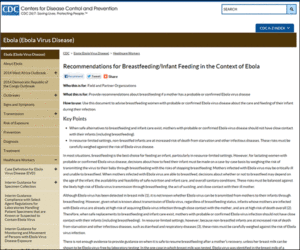 Recommendations for breastfeeding and infant feeding in the context of Ebola.
Recommendations for breastfeeding and infant feeding in the context of Ebola.
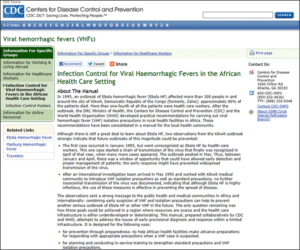 From the CDC, information about infection control for viral hemorrhagic fevers in Africa.
From the CDC, information about infection control for viral hemorrhagic fevers in Africa.
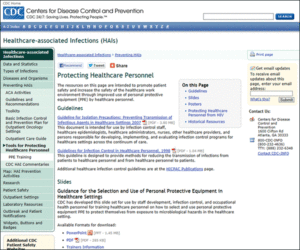 Guidelines for protecting healthcare personnel from the CDC.
Guidelines for protecting healthcare personnel from the CDC.
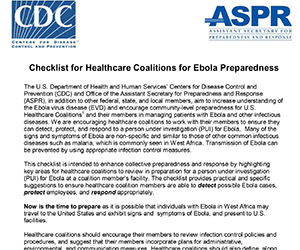 This checklist is intended to enhance collective preparedness and response by highlighting key areas for healthcare coalitions to review in preparation for a person under investigation (PUI) for Ebola at a coalition member’s facility. The checklist provides practical and specific suggestions to ensure healthcare coalition members are able to detect possible Ebola cases, protect employees, and respond appropriately.
This checklist is intended to enhance collective preparedness and response by highlighting key areas for healthcare coalitions to review in preparation for a person under investigation (PUI) for Ebola at a coalition member’s facility. The checklist provides practical and specific suggestions to ensure healthcare coalition members are able to detect possible Ebola cases, protect employees, and respond appropriately.
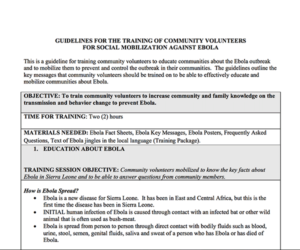 This is a guideline for training community volunteers to educate communities about the Ebola outbreak and to mobilize them to prevent and control the outbreak in their communities. The guidelines outline the key messages that community volunteers should be trained on to be able to effectively educate and mobilize communities about Ebola.
This is a guideline for training community volunteers to educate communities about the Ebola outbreak and to mobilize them to prevent and control the outbreak in their communities. The guidelines outline the key messages that community volunteers should be trained on to be able to effectively educate and mobilize communities about Ebola.
The objective of these guidelines is to train community volunteers to increase community and family knowledge on the transmission and behavior change to prevent Ebola. Included is basic information about Ebola, communication skills training for community volunteers, and explanations of the five stages of behavior change and the five stages of grief.
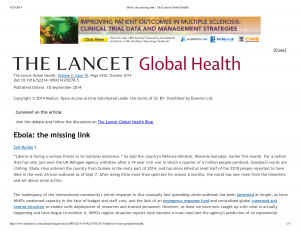 This editorial that appeared in the Lancet Sept. 18, 2014 points out that trust is the “missing link” that could help stem the Ebola epidemic.
This editorial that appeared in the Lancet Sept. 18, 2014 points out that trust is the “missing link” that could help stem the Ebola epidemic.
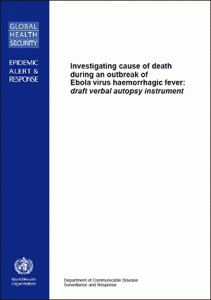 World Health Organization report presenting a draft verbal autopsy instrument based on best judgement and previous experience in a variety of settings including outbreaks and research. It is part of a wider effort by the Global Outbreak Alert and Response Network (GOARN) to develop tools for testing in advance of outbreak situations. The report also contains information on how to carry out a validation study, which compares the results of a verbal autopsy questionnaire with the results of a “gold standard” – such as laboratory test or clinical diagnosis. To date, there is no standard, verbal autopsy instrument for use during outbreaks of Ebola virus haemorrhagic fever (EHF).
World Health Organization report presenting a draft verbal autopsy instrument based on best judgement and previous experience in a variety of settings including outbreaks and research. It is part of a wider effort by the Global Outbreak Alert and Response Network (GOARN) to develop tools for testing in advance of outbreak situations. The report also contains information on how to carry out a validation study, which compares the results of a verbal autopsy questionnaire with the results of a “gold standard” – such as laboratory test or clinical diagnosis. To date, there is no standard, verbal autopsy instrument for use during outbreaks of Ebola virus haemorrhagic fever (EHF).

The Ebola Communication Network was originally developed by the Health Communication Capacity Collaborative (Cooperative Agreement #AID-OAA-A-12-00058) and expanded under Breakthrough ACTION (Cooperative Agreement #AID-OAA-A-17-00017) both under the leadership of Johns Hopkins Center for Communication Programs. This website is now maintained by Johns Hopkins Center for Communication Programs and its contents are the sole responsibility of CCP. The contents of this website do not necessarily reflect the views of USAID, the United States Government, or Johns Hopkins University.
